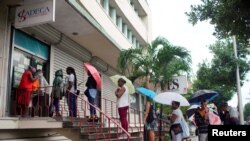"I'm buying dollars, I'm buying euros," Roly, 28, whispers furtively to tourists outside a hotel in Havana.
Roly, who declined to disclose his last name for fear of reprisals, works as a "mule", traveling abroad to buy goods to sell back in Communist-run Cuba where the black market booms due to shortages and high prices in the state-run economy.
But like many Cubans, he says that he is struggling to acquire the hard currency he needs as it has become near impossible in recent weeks to obtain it legally at the country's banks and exchange houses.
Analysts say the recent elusiveness of hard currency is likely due to a deteriorating economic situation and increased demand as the government steps up moves to end Cuba's labyrinthine dual currency system.
Among those affected are Cubans who want to protect themselves from any kind of possible depreciation this complex process could entail by parking their savings in hard currency and those, like Roly, wanting to travel abroad.
Neither of Cuba's two currencies - the peso or the dollar-equivalent convertible peso (CUC) - are legal tender outside the island, where all financial institutions are state-run.
"There's been no money available at the banks or exchange houses for weeks, you have to look elsewhere," said Roly. "I've spent half a day on the streets under the sun and I haven't managed to buy a single dollar."
Cuba's foreign exchange earnings have declined in recent years in tandem with the economic woes of its ally Venezuela and a tightening of the decades-old U.S. trade embargo under President Donald Trump, including increased restrictions on U.S. travel.
Several countries such as Brazil, Bolivia and Ecuador have also ended over the past year contracts under which they hired thousands of Cuban doctors from the state. Such service exports make up most of Cuba's hard currency earnings.
In October, Cuba opened around a dozen stores selling appliances, car parts and other items for dollars, with a bank card. Economists said this should help authorities rake in some hard currency and stem capital flight through the activity of mules such as Roly.
Some say establishing the "dollar stores" could also be a sign the government is bringing back the greenback to stabilize the economy during elimination of the dual currency system, at least during a transition phase.
"The economy is already being dollarized, even if no-one says it" said Cuban economist Omar Everleny. "That the CUC has started to lose value...is a reality".
Cuba's two currencies have circulated on the island at multiple exchange rates ever since the decline of Cuba's former benefactor the Soviet Union as part of a strategy to open up the economy while shielding local industry and citizens.
But the system has for years been deemed more damaging than beneficial to the economy and the government is expected to eliminate the CUC over the next year.
In November, it banned its export and import. Passengers catching flights abroad have to now exchange their CUCs before passing through customs and purchase goods on the other side in tradeable currency.
"For the last few weeks, they've not allowed us to sell hard currency, neither dollars or euros, because there's no money," said Miriam Gonzalez, 55, a cashier at an exchange house.
"They are sending all the hard currency received here to the airport."
Even those with accounts in hard currency at Cuban banks have struggled to get their money out, sometimes having to wait for weeks, much to their frustration.
"You just can't trust our country's banks," said one client, who declined to give her name after attempting to withdraw 500 euros someone had transferred her from Spain. Her bank instead put her on a waiting list.
"There's no money available at the moment ... it's disrespectful."





